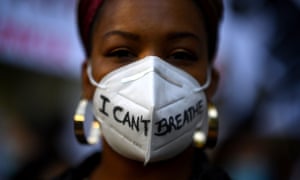Tackling systemic racism is fundamental to achieving environmental and climate justice, according to leading activists, as Covid-19 disparities and the global uprising against police brutality lay bare the ramifications of racial inequalities in every sphere of life.
A wave of protests demanding an end to racist policing have taken place in towns and cities across the world amid mounting evidence that brown, black and native communities have also been disproportionately impacted by the coronavirus pandemic.
Increasingly, experts and protesters have identified racial injustice as the common denominator in police violence, as well as environmental and health inequalities linked to poor Covid-19 outcomes. And on the streets, what started as Black Lives Matter protests have morphed into a movement for racial justice amid growing recognition that systemic racism denies people of colour equal access to economic, social, environmental and climate justice, as well as health equity, political power, civil rights and human rights.
Trump rally in Tulsa spurs renewed call for 1921 racial massacre reparations
“The disproportionate rates of [Covid-19] infection, hospitalisation and deaths are linked to lingering and persistent health, social, economic and environmental inequities facing black Americans, conditions which are rooted in oppression, discrimination, medical apartheid and structural racism … and which today have created a perfect storm,” said Peggy Shepard, co-founder of WE ACT for Environmental Justice, at a press conference this week.
In the US and the UK, research has found that people of colour suffer more air pollution than white residents. Poor air quality, which is linked to multiple respiratory and cardiovascular conditions, significantly increases the risk of death from Covid-19.
As the crowds have grown, so have demands for radical reforms.
“Racism is built into America’s DNA, and since 1619, black Americans have had to endure this violent and oppressive system … Covid 19 exposed our nation’s racial divide,” said Robert Bullard, distinguished professor of urban planning and environmental policy at Texas Southern University and co-chair of the National Black Environmental Justice Network (NBEJN).
Source: Environmental justice means racial justice, say activists

Recent Comments